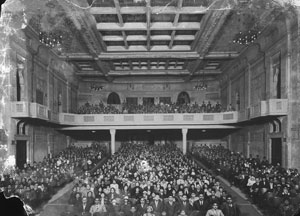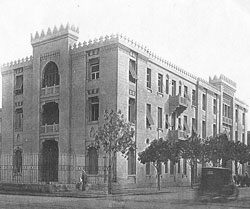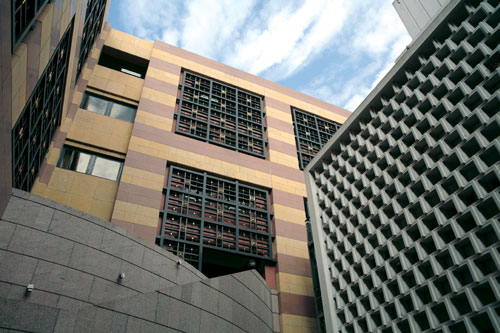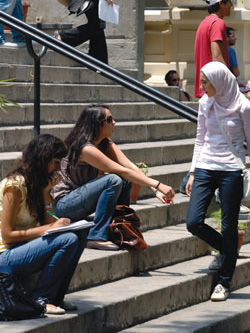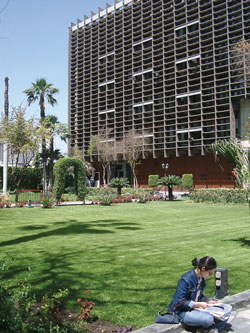s
CONTACT US |
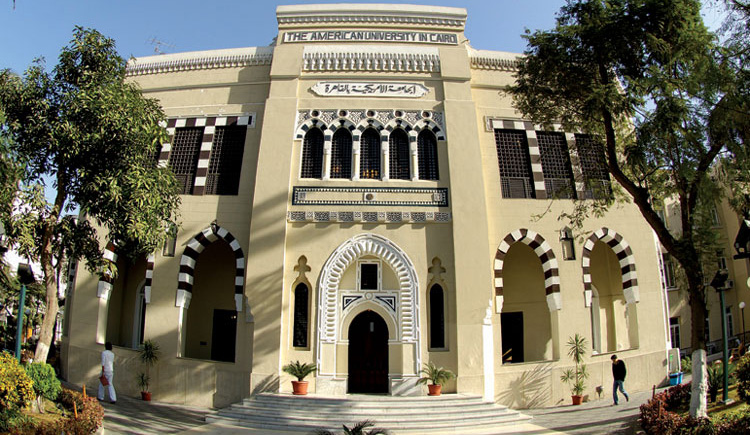
FEATURES Meet the Arab Press ALUMNI PROFILES AKHER KALAM
|
|
Dressing Up Downtown Photos by Ahmad El-Nemr While all eyes are turned to New Cairo, AUC’s presence downtown is being rethought, remodeled and reenergized to provide the Egyptian community with a lasting and important center for culture, arts and education. The Main Campus and the Falaki Academic Center serve as the hub of AUC’s activities downtown, both undergoing significant changes. Within the first few years after the move, the Greek Campus will be sold, Old Falaki will be demolished and part of the Administration Building will be converted into a two-level bookstore. The School of Continuing Education (SCE), Center for Migration and Refugee Studies, Management Center and law department will continue to operate downtown. “The downtown campus will be transformed into a vibrant cultural oasis,” said Waguida El Bakary, associate dean for educational support services at the SCE. “It will be the only contact many visitors to Cairo will have with AUC, and we are sure that their visit will be positive.” In fact, with plans underway for a complete transformation of the downtown campus, tourists won’t be the only ones lining up to relax, learn and socialize in AUC’s oasis. A series of renovations and additions will transform the Administration Building on the Main Campus into the downtown cultural center, a gathering place for lovers of literature, theater, art and academics. The cultural center will house reception areas as well as the Margo Veillon Gallery for Contemporary Egyptian Art, featuring works depicting Egyptian life by one of the most prolific and beloved artists to devote a career to Cairo. AUC will also maintain a strong cultural presence downtown. The Main Campus will continue to host lectures and cultural events, and Ewart and Oriental Halls will provide downtown residents with a link to events in New Cairo. “There will be live transmission for some events, so that while the event is taking place in New Cairo, it would be broadcast in Ewart Hall,” said Ranya Boraie, associate director for special events at the communications and marketing office, adding that “events that prove to be successful in one campus may be held again in the other campus.” Among the most lavish of changes will be what Mirette Mabrouk, associate director of publishing operations at the AUC Press, called “a gorgeously designed new bookstore.” The bookstore will be the centerpiece of AUC’s offering to the community. As a combination café and bookstore, it will take advantage of the lush gardens on the Main Campus to provide space for customers to relax. “We’re planning to open up to the public and provide a nice, quiet place to relax and read,” said Dax Roque, the bookstore’s manager. “You can come in off Tahrir and enjoy garden space, coffee and great books.” In cooperation with the Egyptian Ministry of Culture and the Supreme Council of Antiquities, AUC has already contracted local resident architect Agnieszka Dobrowolska to undertake the internal re-planning of the historic Administration Building ground floor to resemble its original interior style. Roque noted that the bookstore will ensure that AUC remains the center of the literary scene downtown. “We expect to be the main bookstore in the downtown area; this is an exciting time,” Roque noted. “From the bookstore’s perspective we aren’t only moving; we’re adding a whole new store. We’ll have a major presence in Tahrir, as well as on the new campus.” Meanwhile, the SCE will be moving into the Falaki Academic Center. El Bakary put an image to some of the plans. “Old Falaki will be torn down to make way for a large garden entrance to New Falaki,” she said. Inside, the SCE will be the main occupant, sharing space with the Management Center and Engineering Services. The ground floor will provide a centralized location for SCE students to fill in admission forms, register for courses and pay their tuition. “We’ve organized all of the essential offices into one place to streamline students’ registration process,” El Bakary explained. Activity downtown will be further increased by the law department and the Center for Migration and Refugee Studies moving into their new homes in Hill House. These are among AUC’s most internationally acclaimed units, ensuring that Tahrir will remain a site for collaboration, cutting-edge research and progress for years to come. While organizers look forward to all of these plans coming to fruition, completion of the downtown vision is still some time off. Though they will eventually be sold, many of the familiar landmarks of AUC’s downtown campus will temporarily remain under university control. Portions of the Greek Campus, as well as remote offices like the AUC Clinic, will continue to operate for at least one year to ease the transition and provide support to AUC’s downtown faculty, staff and students. With two campuses operating simultaneously, AUC is continuing its rich tradition of education and outreach to different parts of the Egyptian community. “AUC has been a part of downtown Cairo for 90 years, and from cultural exhibits to academic programs, the university will maintain its presence in historic Tahrir Square,” said AUC President David Arnold. “We [also] look forward to AUC becoming an educational anchor for its new community and a stimulant to the cultural and recreational life of New Cairo.”
|
||||||||||||||||||
